
Trying to calculate your pool deck cost? Our guide walks you through both inground and above-ground pool deck cost factors, such as material, location, and labor rates.
Outside awaits with either of these stunning home additions


Terraces are large and spacious outdoor areas.
Balconies are compact, attached structures often found in populated areas.
Terraces have higher construction and maintenance costs but are versatile and profitable.
The lower price of balconies comes with size and customization limitations.
Both terraces and balconies can enhance your daily living by providing access to fresh air, natural light, and breathtaking views. However, it’s important to consider which home addition fits your budget, property layout, and needs. This side-by-side comparison of terraces versus balconies will help you choose the right fit for your home.
A balcony is an elevated and enclosed space that’s compact and narrow in size. A terrace, on the other hand, is a detached area that is open and spacious. It can be beside a building or on its rooftop. Additionally, while balconies have one entry point and connect to the inside of a room, terraces often have multiple entry points and aren’t always directly connected to an indoor area.
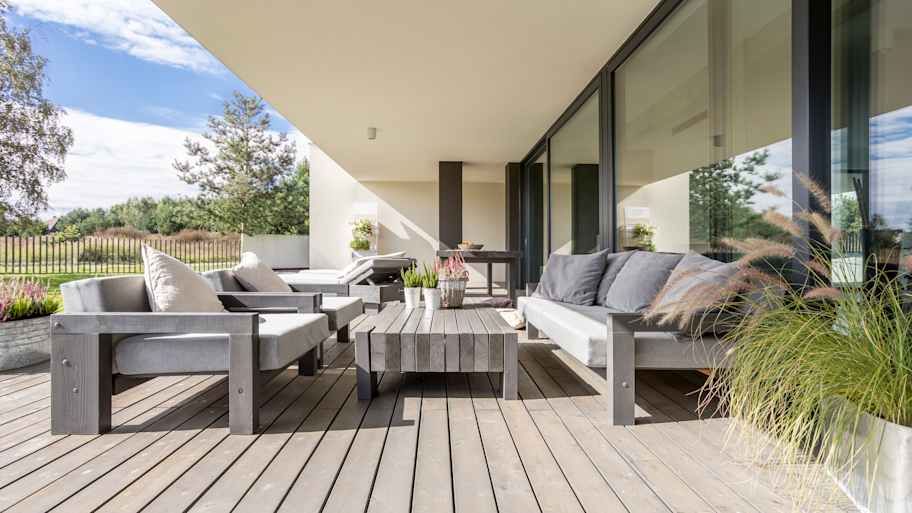
Derived from the Latin word “terra” which means earth or land, a terrace is a slightly elevated, flat outdoor space. While a terrace can be attached to a building, it can also stand as its own area close by or even be located on the rooftop of a building. Due to its open and spacious design, a terrace has several entry points and is sometimes used as a communal space.
| Pros | Cons |
|---|---|
| Spacious | Higher construction cost |
| Versatile | Weather exposure |
| Increases curb appeal and property value | Regular maintenance needed |
Best for:
Homeowners who want a private yet spacious outdoor area
Those with children and pets
Individuals who are willing to invest in construction and regular maintenance
Spacious: The hallmark feature of a terrace is its openness, making it perfect for large social gatherings, furniture, and children and pets.
Versatile: The possibilities are endless for how you can use your terrace. It can double as a garden, exercise area, dining space, or relaxation zone.
Increases property value: A terrace adds an aesthetically appealing and functional edge to your property, which can increase its value if you ever decide to sell.
Privacy: Compared to a balcony that may be visible to neighbors, terraces can offer increased privacy due to their location, size, and customizability.
Higher construction cost: Terrace construction costs more because they’re larger in size. You can expect to pay more for materials and labor.
Weather exposure: While many balconies are enclosed with roofs, terraces are open areas that are prone to weather inconveniences. Sun, rain, wind, and dust can damage your terrace and prevent you from enjoying the space.
Regular maintenance: Terraces need regular upkeep, such as sweeping, pressure washing, mold removal, waterproofing, inspection, furniture care, and more.
May pose security risks: Due to its open layout with multiple entry points, a terrace can pose security risks if not properly addressed.
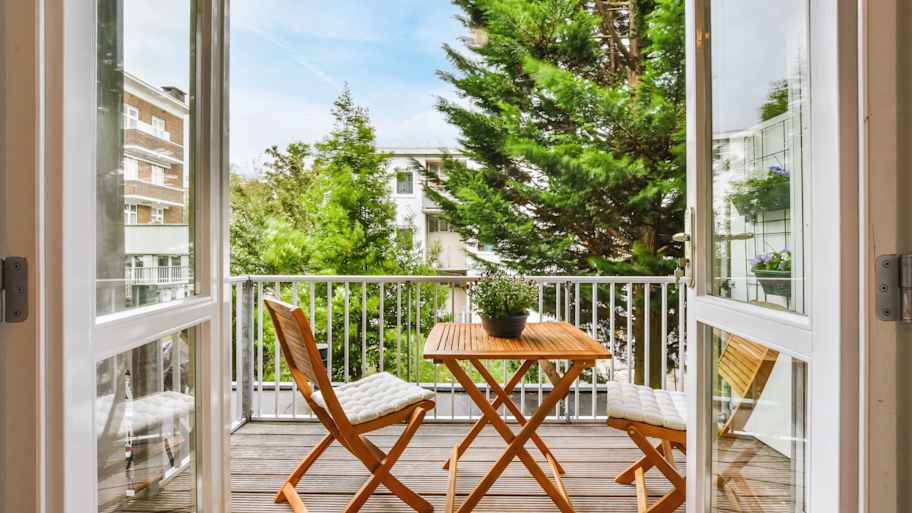
The term “balcony” originates from the Italian word “balcone,” meaning “platform projecting from a wall of a building surrounded by a wall or railing.” A balcony is modest and narrow in size with only one entry point into an indoor room. Due to their building limitations, balconies are often found in apartments, hotels, and homes with several stories.
| Pros | Cons |
|---|---|
| Low maintenance | Limited space |
| Affordable to build | Not as customizable |
| Increases ventilation and light | Safety risks |
Best for:
City areas with limited outdoor access
Those without children or pets
Budget-conscious homeowners who want a low-maintenance outdoor area
Minimal maintenance: Balconies may be smaller in size, but that also means you’ll need less time and money for upkeep. However, it’s still important to keep your balcony clean and in safe condition.
Budget-friendly: The cost to build a balcony ranges between $2,000 and $30,000. Smaller balconies are more affordable than terraces and are within reach for cost-conscious homeowners with intentional budgeting.
Adds light and ventilation: Balconies enhance interior spaces by inviting sunlight and fresh air in, which improves comfort and air circulation.
Limited space: The size of a standard balcony is 4 to 6 feet deep and 6 to 10 feet wide. This means less space for furniture and outdoor activities. Luckily, there are many creative ways to maximize a small balcony.
Lack of customization: Due to structural design and building codes, balconies have less room for customization.
Safety risks: For children and pets especially, balconies can pose a safety hazard if not closely monitored. Structural issues and lack of maintenance can also lead to life-threatening accidents. That’s why it’s so important to build a balcony safely.
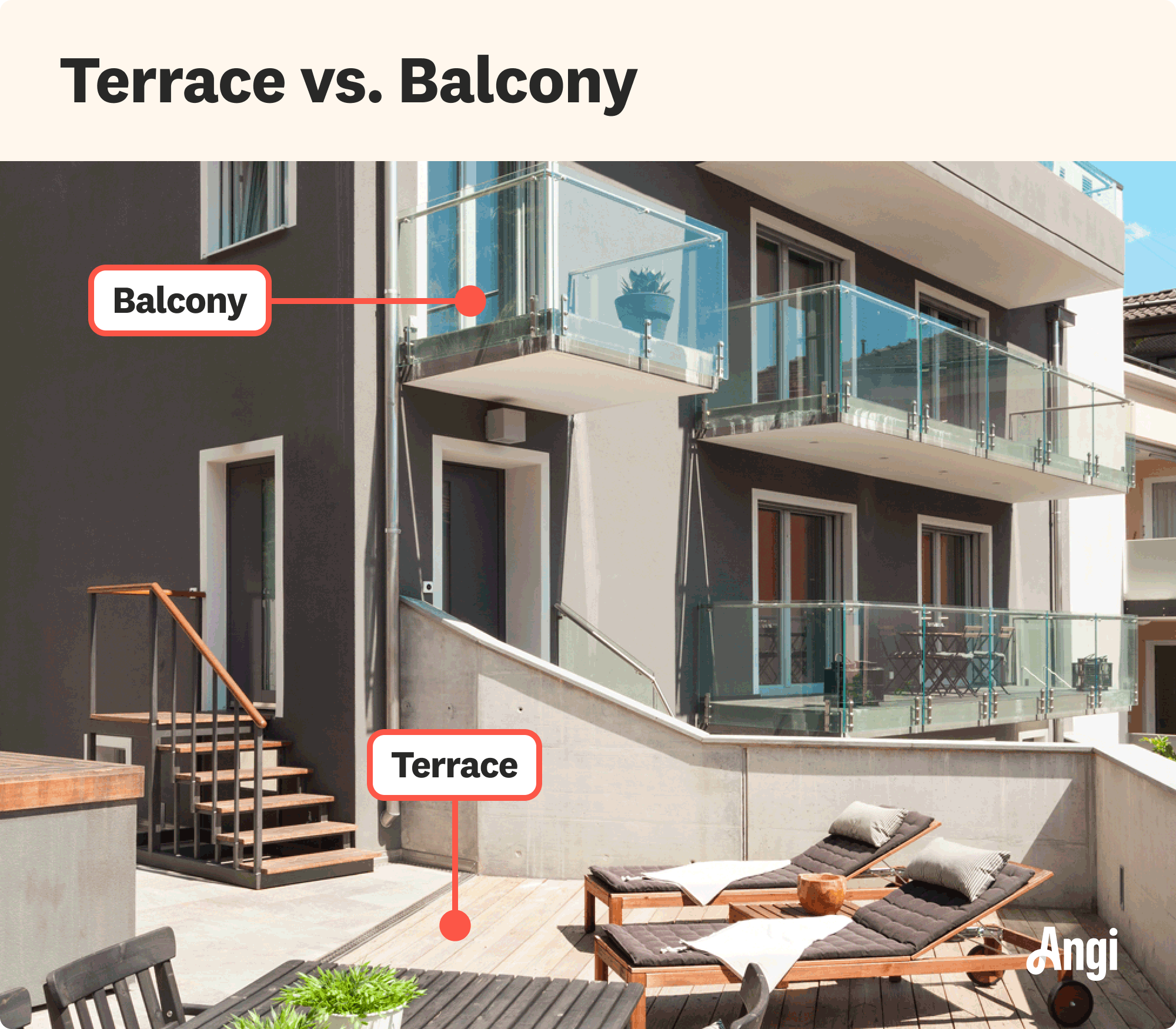
Now let’s compare a terrace versus balcony in specific categories to determine which structure has the competitive advantage.
Often located in a green outdoor area or on a sprawling rooftop, terraces are known for their visual grandeur. You can elevate the look of your terrace with quality landscaping, decor, and furniture to match your style.
Balconies are compact in size, requiring fewer materials and less labor. In addition to having a lower initial cost, the cost of maintaining a balcony is also less expensive compared to maintaining a terrace.
From a structural standpoint, installing a balcony is quicker than terrace installation. Balconies can be prefabricated or cantilevered for a speedy installation, whereas terraces require a solid foundation and advanced construction skills. A local deck and porch professional near you can handle the installation of either outdoor addition.
Because a balcony is so small, there’s a hard limit on how much you can do with it. Terraces are large, open areas that allow you to host dinners with friends and neighbors, play with pets and children, or even cook, if you add an outdoor kitchen.
Balconies are smaller in size and, if enclosed, not as exposed to harsh weather, which means less cleaning and repair work are required over time. Terraces, on the other hand, are larger and fully exposed, increasing the amount of maintenance and repair needed.
Homeowners can see a high return on investment (ROI) for both a terrace and a balcony. Both structures enhance the enjoyment and comfort of your living space while enticing potential buyers.
From average costs to expert advice, get all the answers you need to get your job done.

Trying to calculate your pool deck cost? Our guide walks you through both inground and above-ground pool deck cost factors, such as material, location, and labor rates.

Ipe decking costs vary based on size, construction, finish, and whether you hire a professional. Learn more about how to budget for this project.

If you’re updating a deck or staircase with a modern railing, you may be wondering how much cable railing costs. We dive into the cost factors you need to know.
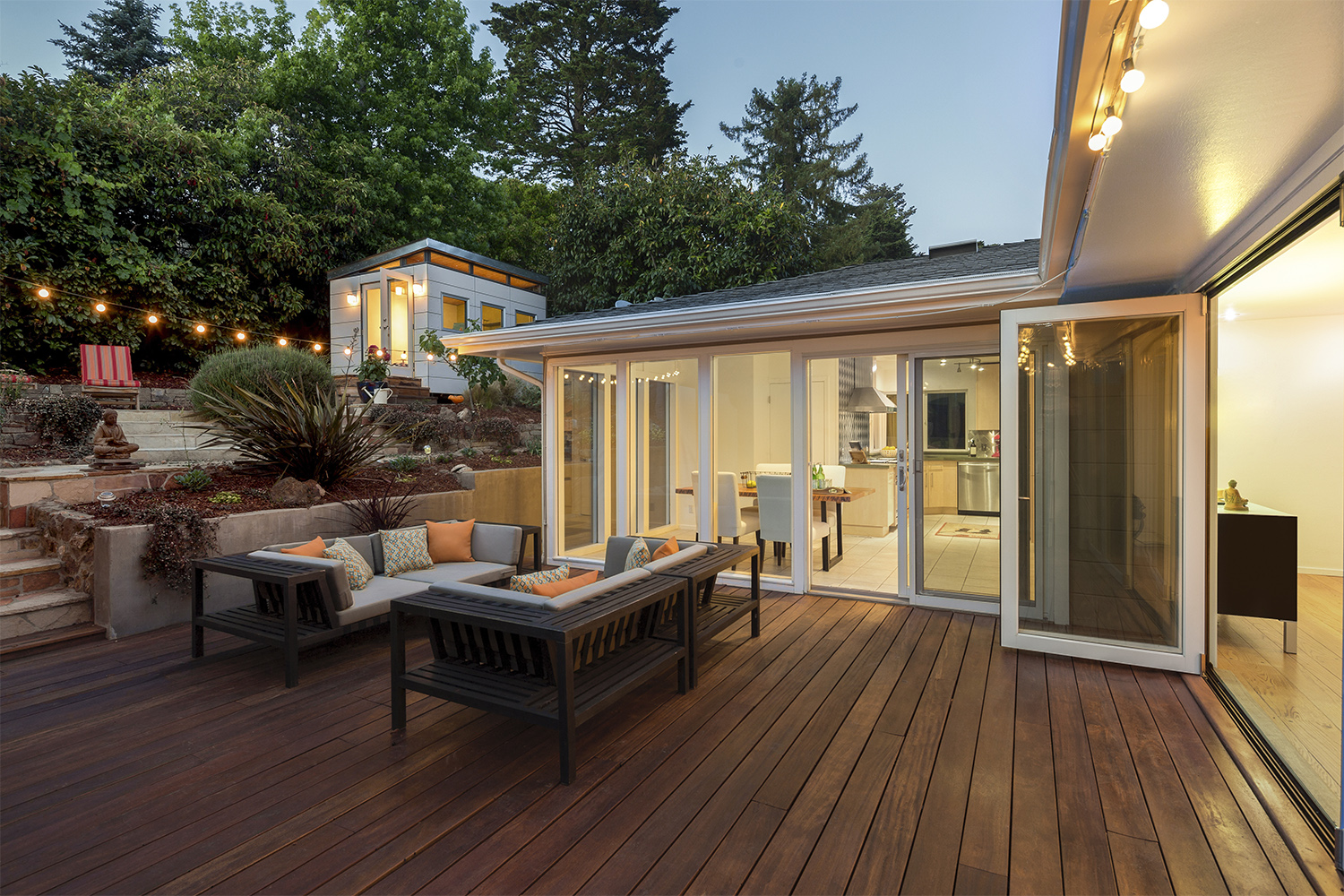
Discover the cost of bamboo decking. Learn about installation prices, key cost factors, and ways to save on your bamboo deck project.
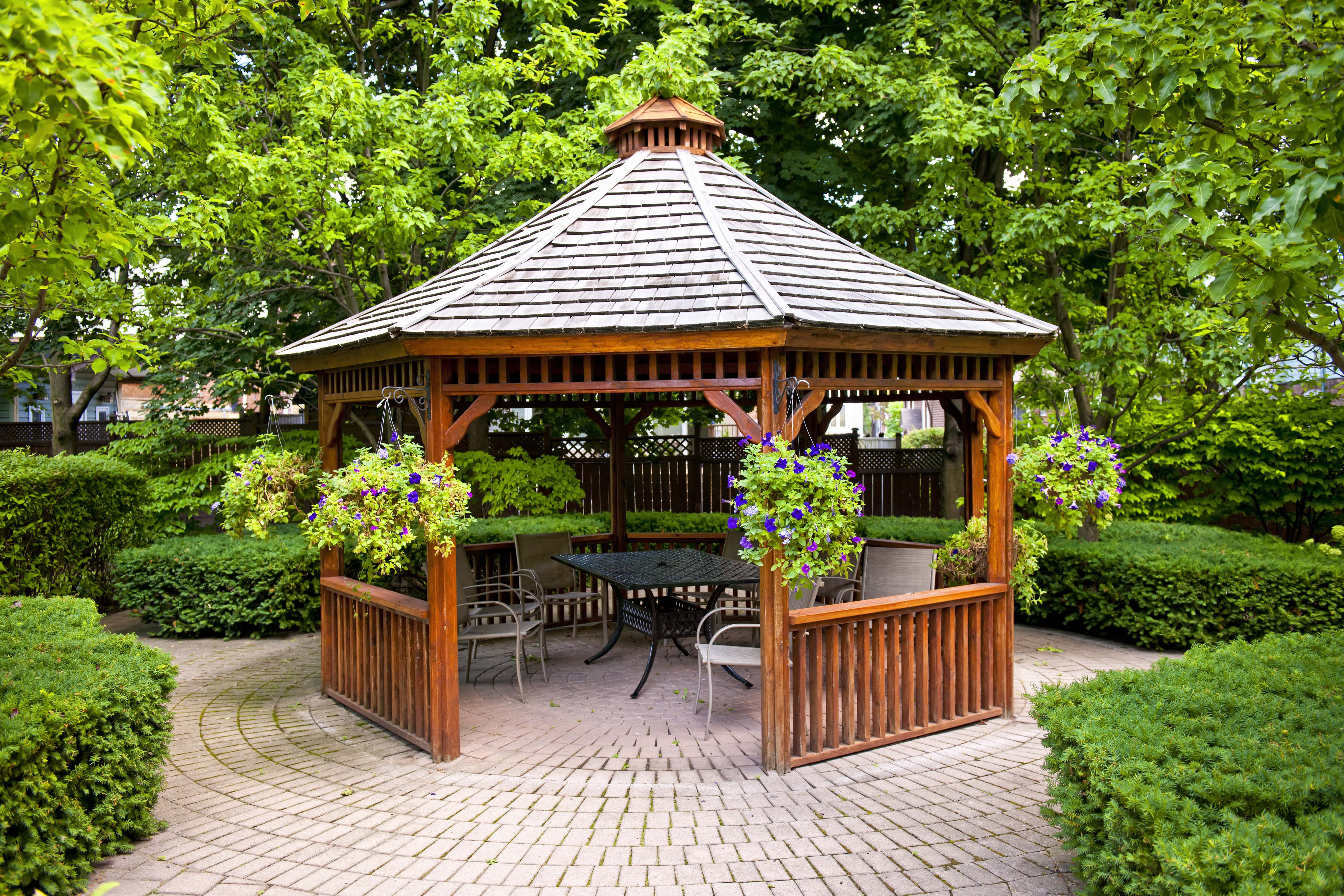
Find who to hire to build a porch or gazebo—compare porch contractors, deck specialists, and gazebo builders, then take your next steps.
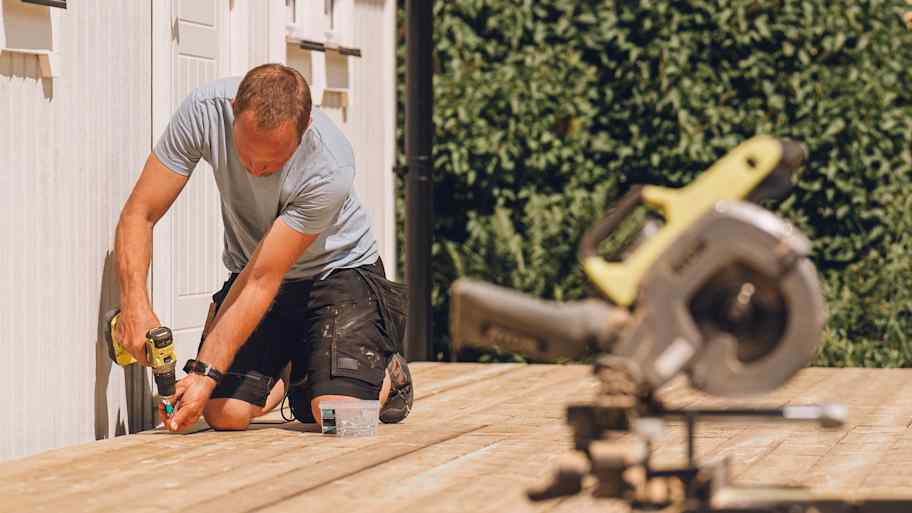
You’re designing your dream backyard deck when an important question crosses your mind: “How much decking do I need?”. Figure it out with this deck calculator.